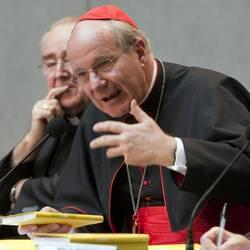By Giacomo Galeazzi
Vatican Insider
September 19, 2011
http://vaticaninsider.lastampa.it/en/homepage/inquiries-and-interviews/detail/articolo/austria-8195/
 |
| THE ARCHBISHOP OF VIENNA, SCHÖNBORN, IS ON A COLLISION PATH WITH THE DISSIDENT AUSTRIAN CLERGY |
Cardinal Schönborn speaks out against a looming schism, putting himself on a colission course with the dissident clergy which is calling for priests' right to marry and communion for divorcees
Austria infelix. It is still causing conflict between Cardinal Christoph Schönborn and dissidents. This wekend, the Archbishop of Vienna spoke out about the risk of a schism in the Austrian Catholic Church.The Episcopate's leader reinforced his view with regard to the clashes among the clergy, that violation of ecclesiastical celibacy and admission of divorced individuals that have subsequently re-married, back to communion, places dissident priests outside the Church.
The Cardinal warned that those who are promoting the reform manifesto with its slogan "A call to disobedience", will not succeed in putting the Archdiocese of Vienna on a collision course with the Holy See. "Everything is possible and I am counting on dialogue and cooperation," the Archbishop said, extending a metaphorical hand but at the same time excluding any possibility of a break with Rome.
Dissidents, led by parish priest Helmut Scgueller, are advocating a series of radical reforms to the Vatican, in close collaboration with Hans-Peter Hurka's ultra neo liberal "We are the church" movement. "We are the church" is the real driving force behind dissent in Austria. It is an important movement in terms of numbers and influence within the Country. It rose from the ashes of the Hans Hermann Groër case. Groër was Schönborn's predecessor in Vienna.
It was after the accusations of paedophilia made against Groër that some Catholics in Innsbruck and Vienna, decided to react and draft the famous "Appeal from God's people", an agenda for the church hierarchy, outlining a number of specific points. Between 1995 and today, the Appeal has been signed by over two million and half people. Indeed, it was initially supported by many Austrian bishops.
Then, however, the prelates were called to order by the Vatican and so they withdrew their support. From that day on, there has been no at least official contact with the hierarchy. And it is likely that still today, Rome in some way fears all the images that that appeal conjures, in whatever form it may manifest and reveal itself today. The sign sent by the Cardinal, one of the Pope's favourite pupils, to Austria and Rome, is crystal clear.
The conflict in Austrian dioceses has been an ongoing thing in recent years, what with liturgical abuses (such as the "Corpus Domini" which was stabbed and waved about during the procession), disciplinary irregularities and violations of ecclesiastical celibacy. In June 2009, Benedict XVI recalled the Austrian Church to order, underlining the urgency for a deeper faith, and for loyalty to the Second Vatican Council and to the Catholic Church's post-conciliar teachings.
Two years ago, the Pope confronted Austrian bishops, who in previous months had protested in the Vatican about the revocation of the excommunication of the Lefebvrians and the appointemnt of hardliner Gerhard Wagner, who defined the Harry Potter saga as "satanic", hurricane Katrina as "divine punishment" and homosexuals as "mentally ill."
Austrian Catholicism is going through a serious crisis, a drop in vocations and in the numbers of faithful, a strong polarisation between conservatives and neo liberals, and a growing anti-Rome sentiment. On many an occasion, Vatican ministers entered into disputes with the Austrian Church over a series of scandals in the Country's dioceses, from parish priest concubines to the failure of neo liberal bishops to take any action against priests who had demanded the right to live with their partners. In spring 2009, Wagner's appointment almost sparked a revolt in Rome.
The Pope was forced to make a U turn and accept Wagner's refusal to take the position. Meanwhile, in the Vatican, the complaints against cases of concubinage involving certain priests who opposed Wagner's appointment, were multiplying. Things were stirre up even further by an inquest into 40 thousand photographs and paedopornographic videos, found in the Sankt Pölten seminary, along with Nazi parodies, celebrations of fictional homosexual marriages between seminarians and sexual acts involving priests and minors.
It was the head of the Austrian Church and leader of the association of Ratzinger's former pupils himself, who, two years ago, included the abolition of ecclesiastical celibacy among the agenda items to be discussed. Indeed, according to the Archbishop of Vienna, Christoph Schönborn, priestly celibacy which is "unique to the Catholic Church," partly explains the cases of paedophilia committed by priests. In May 2010, the Cardinal put such acts down to "priests' education, the consequences of the sexual revolution of '68 and celibacy in the context of a priest's personal development," and advocated "a change in vision."
For some time now, Schönborn has been presenting, in the Curia, an appeal by authoritative Austrian Catholic figures, for the abolition of obligatory celibacy, the return to work of married priests, the opening of the diaconate to women and the ordination of the so-called "viri probati". The "memorandum", which is accompanied by a note by Schönborn, was delivered to the Vatican ministry for the Clergy, along with the request that it be "read carefully" so that "someone in Rome would be aware of what part of our laity think about the Church's problems." Cardinal Schönborn promised promoters of the petition that they would be able to explain their reasons to the Vatican "even if they could not share all of these," and to present reports on the effects the shortage of priests was having on 46 different parishes, especially in rural areas. Last year, Cardinal Schönborn opened Vienna's diocesan assembly claiming a general "mea culpa": "The Church can only put an end to this crisis by purifying itself through genuine repentance. Otherwise, it will all be pointless."
Any original material on these pages is copyright © BishopAccountability.org 2004. Reproduce freely with attribution.